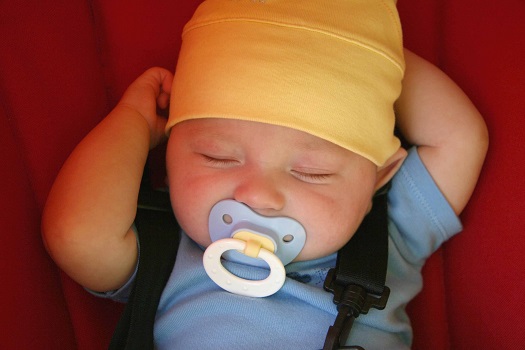As numerous studies show, naps are very healthy and important for baby development. How can you provide good napping conditions?
A newborn baby or infant sleeps more than adults. But this does not mean they sleep more at night, quite the contrary. At night, babies wake often – they need a cuddle or are hungry. What they lose at night, they make up for by napping in the day. They know what’s good for them – a nap is a perfect way to regain strength.
Scientists are still studying how naps affect child development. Most conclude that they are very good for cognitive skills development. Naps improve memory and allow the brain to remember the information it stores. Importantly, it has been proved that naps are also beneficial for speech development and improve remembering words and expressions. You can read more about it here and here.
What does napping mean from a practical perspective? There is only one answer to that, however irritating it is: it depends. On the age, the child’s personality, the rhythm of the day. However, we can try to avoid arduous soothing rituals and make the naps really adjusted to the baby’s needs. Here are a few tips.
Regulate the rhythm of the day
Infants can’t tell the difference between day and night. They only sleep and eat. During the first weeks after birth, the parents can also follow their needs (and nap when the children are asleep because we don’t know when we get another chance to do that). Little by little, introduce a regular rhythm of the day. When you start to take your child for walks, take care to always do it around the same time. Rocked in their pram or sling, children fall asleep, and remember that this is a good time for sleeping. The same goes for bathing, massaging and other everyday rituals – every day they should occur at the same time and in the same order. This makes the child feel safe because they know what is going to happen next. Slowly, very gradually and systematically, your baby will learn about regularity, and it will be easier for them to move on to “another point on the agenda.” Moreover, routines can also help you realize why your baby is fussy – when you realize that it’s nursing or napping time, the baby’s behaviour will be easier to interpret.

Adjust light to the time of the day
Falling asleep requires changes in brain patterns, and this is triggered by hormones and neurotransmitters. The brain is programmed to associate sleep with darkness. Therefore, make sure that you provide your child with a natural day-and-night cycle. When it’s night, it should be dark. When you nurse or change the baby’s nappy or clothes at night, don’t switch on bright light, but rather a small lamp with a dark shade.
Conversely, don’t keep your child in the dark during the day. When they nap, you might want to muffle the light (draw the curtains), but don’t make the room completely dark. If the baby’s naps are long and they wake up often at night, it’s better to leave the curtains open during a nap. Let the baby’s nervous system understand: it’s light, we’re waking up soon!
In the evening, try to avoid using a ceiling lamp, and turn off screens that give offlight around the baby. A smartphone’s screen makes a room very bright even though it’s twilight outside and we’d want the baby’s brain to switch into the night mode.
Observe the baby’s changing needs
A newborn baby may fall asleep after each nursing session. But when they are 2-3 months old, they become more active during the day. Most children at this age switch into the 3-nap mode, with nursing, playing and eye contact with parents in between. Six-month-olds and older children may need only two naps (e.g. during the morning and afternoon walk). Older infants are more and more interested in what is going on around them and are easily distracted. When they are about one year old, they’ll probably stop automatically associating a pram with sleeping – they will want to watch the world, or even leave the pram and crawl or walk near the parent. In that case, it’s good to change the napping ritual and do it after an active walk and light meal, when you’re back home.

Each change to the number of naps needs time for adjustment and patience. During the transition the baby may be especially anxious and fussy, or very active, especially in the evening when we’d like to convince them to go to sleep. It’s normal. You can’t just “programme” another sleeping mode in a child. But they’ll adjust after some time. Remember, though, that there are no standards listing correct nap lengths or how often they should occur. It’s personal and each child has different needs.
Introduce soothing rituals
Newborn children usually fall asleep while nursing. It’s natural. But you might want to know how else you can soothe your child to sleep. Typically, gentle rocking and stroking help, as well as a soft lullaby, pink noise, or carrying in a sling.Try to discover your baby’s favourite ritual, one which will help them calm down and fall asleep. Otherwise, the breastfeeding mum will be the only one able to soothe the baby and that’s unfair – fathers have the right to help the child sleep too (and mum will have time for herself). Introducing such a“soothing” ritual will help in organizing babysitters (e.g. it’s easier then to leave the child with grandparents and be sure they’ll be able to soothe them to sleep).
Last issue to discuss: should we replace nursing with a pacifier? In fact, some children fall asleep easier when they have a pacifier, but others spit it out with disgust. The rule is: a newborn child who is breastfed shouldn’t use apacifier in the first 4 weeks of life. Later, try to avoid them as well. Prolonged sucking may lead to malocclusion, weight gain and problems in regulating emotions. But some children have a very strong need for sucking and they, once they are at least 1 month old, can use a pacifier, but as rarely and briefly as possible.

Teach them to calm down
Some children grow out of naps early and don’t want them as early as in the second year. You can’t force anyone to sleep. Especially that the more nervous the parents are, trying to force something, the more difficult it is for the child to calm down.
What can you do if that’s the case, especially that experts agree on the importance of naps? Your child should spend time outdoors, not in front of TV, tablet, or smartphone. Introduce the ritual of resting after lunch. Mute your phone, draw the curtains, go to bed with your child to cuddle and read books. Perhaps sleep will come? Or not. Regardless, it’s a good idea to teach them to regenerate strength and energy.














Many thanks.keep up the good work